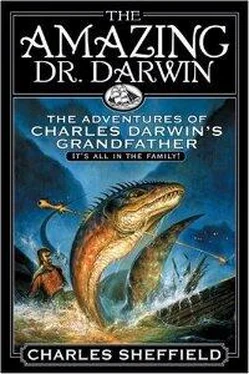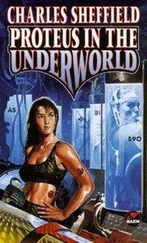Jacob Pole was glad to hear it. It meant that the physician was confident enough to permit his usual optimistic outlook to reemerge.
“Come on, then, Erasmus,” he said. “Your carriage should still be ready and waiting. I can’t tell you how much I appreciate what you’ve done for us. First Emily, and now Elizabeth. One life can never repay for two, but you know I’m ready should you ever need help yourself.”
The two men took a last look at the sleeping patient, then Jacob Pole picked up the medical chest and they left the room. As they did so, the housekeeper came in to maintain the vigil on Elizabeth Pole. They walked quietly past her, down the stairs and on to the front of the silent house. Outside, the night sky was clear, with a gibbous moon nearing the full. A hovering ground mist hid the fields, and the distant lights of Lichfield seemed diffuse and deceptively close. The sulky was waiting, the old horse standing patiently between the shafts and munching quietly at her nosebag.
“That’s strange.” Jacob Pole paused in his work of filling the mare’s nosebag. He looked down the road to the south. “Do you hear it, Erasmus? Unless my ears are going, there’s a horseman coming this way, along the low road.”
“Coming here?”
“Must be. There’s no other house between here and Kings Bromley. But I don’t expect visitors at this hour. Did you promise to make any calls out that way?”
“Not tonight.”
They stood in silence as the faint jingling of harness grew steadily louder. The rider who at last came into view seemed to be mounted on a legless horse, smoothly breasting the swirling ground mist. The Derbyshire clay, still slick and moist from the afternoon rain, muffled the sound of the hooves. The rider approached like a phantom. As he grew closer they could see him swaying a little in the saddle, as though half asleep. He cantered up to them and pulled aside the black face-cloth that covered his nose and mouth.
“I’m seeking Dr. Darwin. Dr. Erasmus Darwin.” The voice was soft and weary, with the flat vowels of a northcountryman.
“Then you need seek no further.” Jacob Pole stepped forward. “This is Dr. Darwin, and I am Colonel Pole. What brings you here so late?”
The other man stiffly dismounted, stretching his shoulders and bowing at the waist to relieve the cramped muscles of a long ride. He grunted in relief, then turned to Darwin.
“Your housekeeper finally agreed to tell me where you were, Doctor. My name is Thaxton, Richard Thaxton. I must talk to you.”
“An urgent medical problem?”
Thaxton hesitated, looking warily at Jacob Pole. “Perhaps. Or worse.” He rubbed at the black stubble on his long chin. “ ‘Canst thou not minister to a mind diseased?’ ”
“Better perhaps than Macbeth could.” Erasmus Darwin stood for a moment, head hunched forward on his heavy shoulders. “Who suggested that you come to me?”
“Dr. Warren.”
“Warren of London?” Darwin’s voice quickened with interest. “I doubt that I can do anything for you that he cannot. Why did he not treat your problem himself?”
Again the other man hesitated. “If Dr. Warren is an old friend, I fear that I bring you bad news. He can no longer sustain his practice. His health is failing, and he confided in me his belief that he is consumptive.”
“Then that is bad news indeed.” Darwin shook his head sadly. “To my mind, Warren is the finest diagnostician in Europe. If he has diagnosed consumption in himself, the prospect is bleak indeed.”
“He holds you to be his master, especially in diseases of the mind. Dr. Darwin, I have ridden nonstop from London, and I must get back to Durham as soon as possible. But I must talk with you. Dr. Warren offers you as my only hope.”
Thaxton’s hands were trembling with weariness as they held the bridle. Darwin scrutinized him closely, measuring the fatigue and the despair.
“We will talk, Mr. Thaxton, never fear. But I cannot stay to do it. There is an urgent case of childbed fever six miles west of here. It cannot wait.” He gestured at the carriage. “However, if you would be willing to squeeze into the sulky with me, we could talk as we travel. And there is a hamper of food, that you look to be sorely in need of.”
“What about my horse?”
“Leave that to me.” Jacob Pole stepped forward. “I’ll see he gets a rubdown and feed. Erasmus, I suggest that you come back here when you are done, and take some rest yourself. I can send one of the servants over to Lichfield, to tell your household that they can reach you here.”
“Aye. It bids fair to be a long night. Say that I will be home before sunset tomorrow. This is a bad time of year for fevers and agues.”
“No need to tell me that, Erasmus.” Jacob Pole smiled ruefully and looked at his own shaking hand, as the other two men climbed into the carriage. As they moved off into the mist, he stirred himself with an effort and led the horse slowly to the stables at the rear of the house.
* * *
“It is a long and confusing story, Dr. Darwin. Bear with me if it seems at first as though I am meandering.”
Food and brandy had restored Thaxton considerably. Both men had made good use of the hamper of food and drink balanced between them on their knees. Darwin wiped his greasy hands absentmindedly on his woollen shawl, and turned his head to face Richard Thaxton.
“Take your time. Detail is at the heart of diagnosis, and in the absence of the patient—since it is clear that you are not he—the more that you can tell me, the better.”
“Not ‘he,’ Doctor. She. Three years ago my wife, Anna, went to see Dr. Warren. At that time we were living in the heart of London, hard by Saint Mary-le-Bow. She had been feeling lacking in strength, and was troubled by a racking cough.”
“With bleeding?”
“Thank God, no. But Dr. Warren was worried that she might become phthisic. He recommended that we move away from the London style of life, to one with more of country ways and fresh air.”
Darwin nodded approvingly. “Warren and I have seldom disagreed on diagnosis, and less still on treatment. You took his advice?”
“Of course. We moved back to my family home, Heartsease, near Milburn in Cumbria.”
“I know the area. Up in the high fell country. Clean air, and clear sun. A good choice. But did it fail?”
“Not for my wife’s general health, no. She became stronger and more robust. I could see the improvement, month by month. Then—about one year ago—there came another problem. She began to see visions.”
Erasmus Darwin was silent for a long moment, while the carriage rolled steadily along the graveled roads. “I see,” he said at last. “Invisible to others, I take it?”
“Invisible to all, save Anna. Our house stands north of Milburn, facing out across Cross Fell. Late at night, in our bedroom, when the Helm stands on the fell and the wind is strong from the north, she sees phantom lights moving on the fell slopes, and hears crying in the wind.”
“You have looked for them yourself?”
“I, and others. I have brought our servants upstairs to look also. We see nothing, but Anna is persistent.”
“I see.” Darwin paused again, reflective, then shrugged. “Even so, it does not sound like a matter for serious concern. She believes that she can see what you cannot. What harm is there in a will-o’-the-wisp? It does not interfere with your life.”
“It did not.” Thaxton turned directly to Darwin, intense and troubled. “Until three months ago. Then Anna found a book in Durham telling of the early history of our part of the country. Cross Fell had another name, long ago. It was known as Fiends’ Fell. According to legend, it was renamed Cross Fell when St. Augustine came with a cross to the fell and drove out the fiends. But Anna says that she has seen the fiends herself, on two occasions. By full moonlight, and only when the Helm is on the fell.”
Читать дальше












